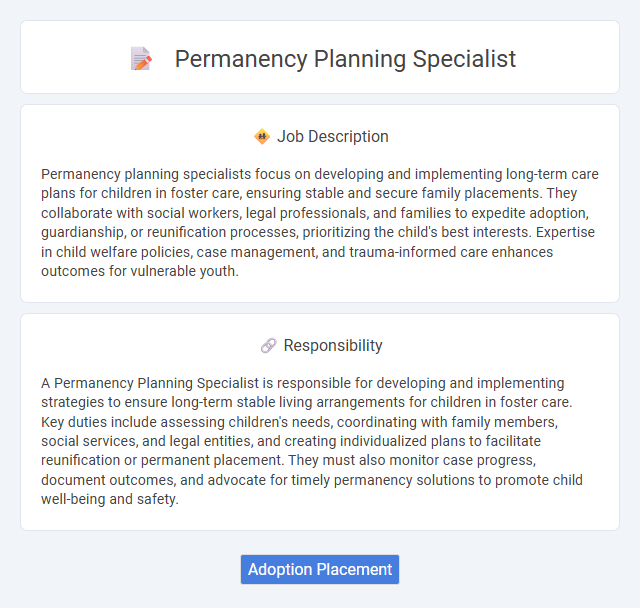
Permanency planning specialists focus on developing and implementing long-term care plans for children in foster care, ensuring stable and secure family placements. They collaborate with social workers, legal professionals, and families to expedite adoption, guardianship, or reunification processes, prioritizing the child's best interests. Expertise in child welfare policies, case management, and trauma-informed care enhances outcomes for vulnerable youth.
Individuals with strong emotional resilience and excellent communication skills are likely suitable for a permanency planning specialist role, as the job involves supporting families through challenging circumstances. Those uncomfortable with high-stress environments or dealing with sensitive family dynamics may find this position less fitting. A background in social work or psychology could increase the probability of success in this career path.
Qualification
Permanency planning specialists typically hold a bachelor's degree in social work, psychology, or related fields, with many employers preferring a master's degree in social work (MSW) or counseling. Certification or licensure as a social worker (LCSW or equivalent) enhances credibility and career advancement opportunities. Essential qualifications include strong knowledge of child welfare laws, case management skills, and experience working with families and the foster care system.
Responsibility
A Permanency Planning Specialist is responsible for developing and implementing strategies to ensure long-term stable living arrangements for children in foster care. Key duties include assessing children's needs, coordinating with family members, social services, and legal entities, and creating individualized plans to facilitate reunification or permanent placement. They must also monitor case progress, document outcomes, and advocate for timely permanency solutions to promote child well-being and safety.
Benefit
Permanency planning specialists likely enhance children's stability by coordinating long-term care solutions, which may result in improved emotional and developmental outcomes. Their role probably supports families in navigating complex legal and social systems, potentially reducing placement disruptions. This position could offer a meaningful career with the opportunity to make a significant impact on vulnerable populations' lives.
Challenge
Permanency planning specialists likely face the challenge of balancing complex emotional situations with legal and procedural requirements to ensure stable outcomes for children. Navigating diverse family dynamics and addressing systemic barriers probably demand strong problem-solving skills and resilience. The role may involve frequent high-stress scenarios requiring quick decision-making and effective collaboration with multiple stakeholders.
Career Advancement
Permanency planning specialists play a crucial role in child welfare by developing long-term care plans that ensure stable, permanent living arrangements for children in foster care. Career advancement in this field often involves gaining expertise in family dynamics, legal processes, and case management, positioning professionals for roles such as child welfare supervisor, program coordinator, or policy analyst. Pursuing advanced certifications or degrees in social work and related disciplines enhances opportunities for leadership positions within government agencies or nonprofit organizations dedicated to child advocacy.
Key Terms
Adoption Placement
A Permanency Planning Specialist in Adoption Placement coordinates and facilitates the approval of adoptive families by conducting thorough home studies and background checks. They collaborate with legal teams, child welfare agencies, and foster families to ensure all adoption documentation complies with regulatory standards. This role demands expertise in child welfare policies, excellent communication skills, and a commitment to securing permanent, safe homes for children in foster care.
 kuljobs.com
kuljobs.com